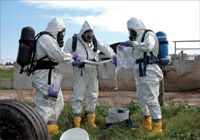FBI conducts agro-terrorism drill at Penn Vet center
Kennett Square, Pa. - Is this country ready for an agroterrorism attack? The FBI recently worked with the veterinary school at the University of Pennsylvania's New Bolton Center. Six Penn veterinary students participated.
Kennett Square, Pa. — Enforcing a quarantine to prevent movement of farm animals within a circle 12 miles in diameter was more than even the anti-terrorism team had bargained for.

Successful search: A hazardous-materials team uncovers a hidden "biological agent" on the target farm.
"They were dismayed when they realized the scale of this quarantine. There are so many roads within an area that size, and they'd need checkpoints on all of them to contain a serious disease outbreak," says Dr. Gary Smith, a professor of population biology and epidemiology at the University of Pennsylvania's School of Veterinary Medicine. "They knew they'd need to find an alternate solution that wouldn't overtax available resources."

Dr. Gary Smith
Still, the agro-terrorism drill at the school's New Bolton Center on Oct. 15 was pronounced a success, in that its two basic objectives were met: A mock explosive device on an identified farm was located, and a robotic device "disarmed" it; and the haz-mat team found a hidden biological agent in a pasture.
Smith was Penn Vet's coordinator, helping authorities organize and implement the exercise, but the actual players were law-enforcement personnel and hazardous-material team members. Six Penn Vet students did act as farm hands, who were "interrogated" during a search of the target farm.
In addition to the exercise at New Bolton, authorities conducted two others, in Philadelphia and Chester County. Participating organizations besides Penn Vet included the FBI's Philadelphia division, the U.S. Attorney's office, Pennsylvania Department of Agriculture, local emergency services and health department personnel and St. Joseph's University.
Planned for more than a year, the test aimed to determine how a rural area might deal with a deliberately introduced "foreign animal (livestock) disease." The particular disease wasn't revealed to the news media.
Agro-terrorism involves such acts as introducing livestock diseases such as hoof-and-mouth disease or mad-cow disease in an attempt to hurt the U.S. agricultural industry.
A disease like hoof-and-mouth, spread by a virus easily carried in the air and by animal movement and contact, could have a devastating economic impact, Smith explains.
"In both the United States and Europe, the policy is to stamp out the disease, and that means depopulating whole herds and all contacts, including those on contiguous farms. The losses can be huge, affecting even related industries and tourism," Smith says.
That was the exact scenario during a hoof-and-mouth outbreak in Great Britain last year.
Such a disease could enter the United States through the introduction of diseased animals that would infect U.S. livestock, or by the entry of trash that contained infectious materials, Smith says.